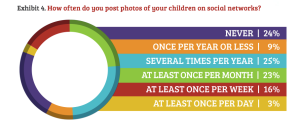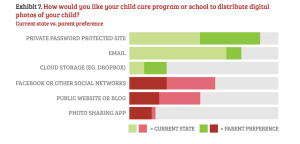 Photo albums, do you still use them?
Photo albums, do you still use them?
Now when a milestone approaches in your life, there’s a new social obligation most of us add to our ‘to do list.’ No longer do most of us collect and put our photos in albums to pass around and share with guests. Instead, we post. Photos, comments, ticket stubs, you name it, on Facebook or Twitter or Instagram.

“It’s called an external factor,” says Ron Spreeuwenberg, CEO of HiMama “whenever you have a major event the presumption is you’ll post details. Like if you’re having a child, when is that child expected, what are you doing to prepare, is it a boy or a girl, when will you share that first photo? And if you don’t post, you’re the odd person out.”
It’s part of this tug of war parents have with their online relationship and how that exposure could affect their young children that prompted HiMama to release details of their inaugural study, Parents in a Digital Age 2015 this week.

The report is based on a survey of over 400 parents in the United States and Canada. Spreeuwenberg says the findings show what he describes as a “mis-alignment of their personal feelings about sharing their kids’ information online.”
-
Nearly 70% of parents are concerned about digital security and privacy for their children. “We were surprised that of the 70% concerned about digital security, 43% of that number described themselves as extremely concerned. In fact, only 6% of parents surveyed said they were not concerned about digital security as it relates to their children. Still, when you asked them whether their online posts included their kids, nearly everyone said yes.”
-
Over half of parents’ outlook on digital security and privacy for their children has worsened in 2014 from the prior year. “This worsening of their concern about digital security and privacy seems out of line with the growth in online posting. One would think parents would be more comfortable with digital security simply because they post so much. Instead, we see a more cautious outlook with this growing uncertainty and a real questioning of privacy issues.”
-
Parents’ are more lax in posting information of their children online relative to their stated concerns about their children’s online presence. “This dichotomy for those we polled was dramatic. The social pressure to post is so great. It’s so easy to share, it’s hard not to share.”
-
Over three quarters of parents post photos of their children on social networks, however, over half were unaware that Facebook owns digital rights to photos on their site. “This is where parents can become better educated about who actually owns the rights to their photos. On Facebook, even if you set up a closed group to share your children’s photos, you still have to face the fact that the rights of those images online belong to Facebook.”
-

(Credit: HiMama) Parents want more information from their children’s schools and child care providers and want this information through more private and secure channels. “For example, other than email, the two main channels through which schools and child care programs distribute digital photos of children is Facebook and other social networks, public websites, and blogs. These are not secure or private channels and organizations using these channels should be mindful of the risks they’re taking with children’s online safety and privacy.”
“There is a small segment of the population, less than five percent,” says Spreeuwenberg, “who are uber sensitive to posting anything online about their children. They are voicing their concerns about privacy and security and want to make sure their kids aren’t exposed online at all. But while the rest of the population may have issues, they haven’t taken this hard line approach.”
I know I grew up in a time when photo albums, kept in our family’s living room, held every single picture of special moments in the life of my parents, my siblings and my relatives. We grew up sending prints of school photos in the mail to loved ones to mark the new year. I remember making double prints every time I had my photos developed, to share pieces of my life with my family. Now those photo albums are in a closet, and adding new pictures in such an album is an exercise I promise I’ll do sometime, but I’m not sure when.
I cannot recall the last time I sent a photo in the mail, Christmas cards don’t count, when I can so easily upload any image from my phone or camera directly to a social media site. And that’s part of the issue, according to Spreeuwenberg.

“The dominant channels for sharing photos of children were Facebook and other social networks, as well as email, which dwarf the other methods for sharing photos. This is an interesting result when contrasted against parents’ concerns about digital security and privacy for their children. While a private password protected site would be a much safer way to share photos, for example, a much smaller percentage of surveyed parents actually used this channel. So while many parents feel they don’t have an alternative to posting online, that’s really not the case.”
There are options, but not as easy and fast as uploading and posting, that’s for sure. As parents, we might feel free to go ahead and share those images as part of our own history, but there is one place where we are clear we want a say, in our child’s school or day care program. And the only way we know for sure is to ask about each institution’s policies.
The line between being relaxed about exposing our children online to taking it more seriously is blurry for many of us. We’re okay sharing when we want to share, most of us are not okay when someone else shares without us knowing, especially when it comes to our kids.
lois.melkonian@digital-staging.kdvr.com
[twitter-follow screen_name=’LoisMelkonian’ show_screen_name=’no]